US Reaffirms Support for Women Amid Iranian Hijab Crackdown Threats

The US State Department reiterates its commitment to Iranian women's rights amidst President Ebrahim Raisi's comments on intensified hijab enforcement.

The US State Department reiterates its commitment to Iranian women's rights amidst President Ebrahim Raisi's comments on intensified hijab enforcement.
Matthew Miller, the State Department Spokesman, on Wednesday emphasized the importance of allowing women to make personal choices about their attire.
"It is our belief, as we’ve said before, that women in Iran and everywhere should be free to wear what they want," said Miller. "Iranian women should not have to worry about Iranian authorities using surveillance technology or any other methods to impose control over them. The United States has and will continue to take action to support the human rights and fundamental freedoms of the people of Iran, including women – the women and girls of Iran, and to work with allies and partners to pursue accountability for the perpetrators of human rights abuses."
Raisi's recent statement, issued on Wednesday, threatened an end to protests against the hijab, attributing them to foreign influences. He pledged to employ a response to quell the protests and "raise awareness" among those not adhering to the hijab.
"Certain individuals, not adhering to hijab, may lack awareness. Our duty is to raise their awareness,” Raisi asserted, adding that "foreign influences are orchestrating an organized campaign to abolish the hijab."
Raisi's announcement comes against the backdrop of ongoing defiance by Iranian women and girls against the compulsory headscarf. Notably, Raisi's comments arrive weeks before the anniversary of the tragic death of Mahsa Amini while in the custody of the morality police.
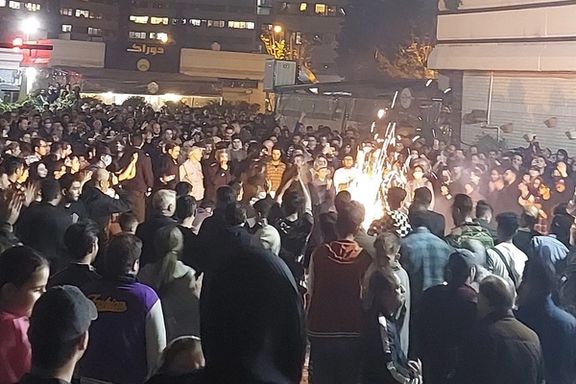
The Revolutionary Guards (IRGC) spokesman threatened Iranian journalists this week not to help the enemy with their work, meaning to avoid critical reporting.
"Creating hope against the hostile media’s attempts to cause disillusionment is one of the most important missions of those working in the media," stated Ramezan Sharif during a ceremony on Monday, held in honor of National Journalists Day (August 8).
President Ebrahim Raisi visited the state broadcaster (IRIB), a massive organization with over 40,000 employees, to express his appreciation for their work, ahead of Journalists Day. In a brief speech, he asserted that his government listens to criticism.
However, Iranian journalists are currently remembering two colleagues who have been imprisoned for almost a year due to their reporting on the death of Mahsa Amini while in custody in September 2022. They are also paying tribute to over a hundred other journalists who have been arrested since then and handed various punishments, including prison sentences, bans on using mobile phones and social media, travel restrictions, and even lashes.
Several newspapers, including Shargh, Ham-Mihan, and Etemad, dedicated articles on Monday to Niloofar Hamedi, a reporter from the reformist Shargh newspaper, and Elaheh Mohammadi, a reporter for the reformist Ham-Mihan.
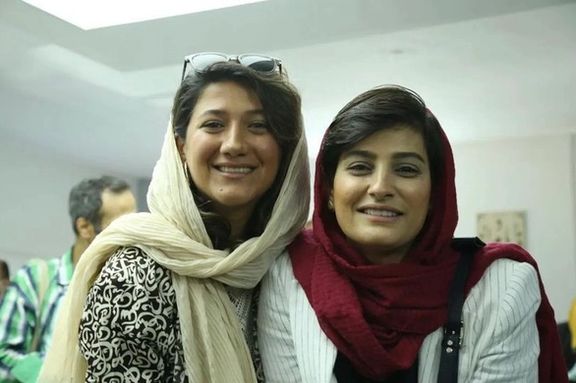
These two young women were the first journalists to cover Amini’s story, which sparked widespread protests across the country from mid-September to early January.
Under the headline "Journalists More Abandoned Than Ever," with photos of the imprisoned journalists displayed on its front page, Ham-Mihan, a newspaper not directly controlled by the government, highlighted the intensified lack of freedom of speech and job security that journalists have faced in the past year. The newspaper stated that journalism has now become a "high-risk" profession.
Since last year’s protest movement, the press has had to contend with "professional claimants" who scrutinize newspapers daily to find reasons for legal action. Ham-Mihan added that authorities expect both print and online media to align only with the views of those in power.
A photo taken by Hamedi at the hospital where Mahsa Amini was in a coma in 2022, with her parents embracing her, rapidly spread across social media platforms. Amini had been fighting for her life for three days after sustaining injuries during her arrest by the morality police for wearing her hijab “improperly.”
Mohammadi in turn managed to travel to Amini’s hometown of Saqqez in western Iran to report on her funeral on September 17, which thousands attended.
The two journalists, accused of being CIA agents by the Revolutionary Guards' intelligence organization (SAS), faced charges of propaganda against the regime and conspiracy to commit acts against national security.
Hamedi and Mohammadi were tried behind closed doors in June and are awaiting sentencing. Since their arrest over 310 days ago, they have been denied family visits on many occasions, have never been granted furlough, and have been denied access to an attorney during their trials.
Dozens of other journalists are currently awaiting sentencing. Some have been banned from journalism, including Etemad newspaper’s managing director, Elias Hazrati, who was recently prohibited from any media work for a year.
Elaheh Mohammadi’s twin sister, Elnaz Mohammadi, who has also been a journalist for over a decade, told Etemad newspaper that her sister and Niloufar Hamedi were driven by their commitment to society and their calling as journalists.
“There is pain, and it’s so heavy that it diminishes hopes for the future of journalism in Iran. But I must say, the light is still alive and shining,” she said.
“Journalists’ Day is still a good occasion for us to remind ourselves of what is happening to the media in the country, how much we have to self-censor, and sometimes not do what we thought was one hundred percent right,” Niloufar Hamedi’s husband, Mohammad-Hossein Ajorlou, told Etemad.
Government pressures on journalists are forcing them to leave the country, pursue other jobs if they choose to remain in Iran, or compromise the quality of their work to avoid trouble if they continue as journalists, Ajorlou added."

The British Ambassador to Iran has been summoned to Iran’s foreign ministry after he published comments calling for the release of jailed journalists.
Simon Shercliff tweeted on Tuesday, acknowledging Iran's celebration of August 8 as the 'Day of the Journalist'. The ambassador expressed solidarity with journalists facing hindrances in their work and called for the release of arbitrarily detained individuals, including journalists.
The Iranian Ministry of Foreign Affairs deemed these remarks as "irresponsible, and out of diplomatic norms," asserting that such comments amounted to interference in Iran's internal affairs and were unacceptable. Shercliff was then summoned to the ministry.
"The UK, with its indefensible record towards the Iranian people, is not in a position to comment on the Islamic Republic of Iran. Here is the Islamic Republic of Iran, and we will not allow the sovereignty of the country to be neglected with arbitrary actions," stated the foreign ministry.
Iran has been facing international criticism for its press freedom record for decades. The country ranks third globally in terms of incarcerated journalists, trailing only China and Myanmar, according to recent reports. The 2023 World Press Freedom Index, compiled by Reporters Without Borders (RSF), positioned Iran at the lowest rung on the list, only marginally above countries such as Vietnam, China, and North Korea.
Over the years, Iran has detained hundreds of journalists, writers, and bloggers, often on charges of jeopardizing national security through the expression of their opinions. Tragically, some of these individuals lost their lives while in custody.
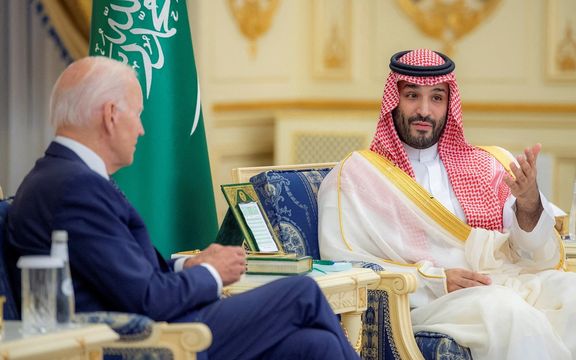
The United States is pushing for a deal between Israel and Saudi Arabia, the success of which can further isolate the Islamic Republic of Iran in the region.
Iranian government-controlled media have labeled any potential Saudi Israeli deal a regional security threat, seeing the clear implications of a broad pro-West front emerging in the Middle East. Some analysts in Iran have said that Riyadh anticipating a l agreement with Israel, restored diplomatic relations with Tehran in March.
Axios on Wednesday cited four Israeli and US officials as saying that Israeli Prime Minister Benjamin Netanyahu seeks to get a security agreement with the US focused on deterring Iran in the context of the mega-deal the Biden administration is trying to broker with Riyadh and Jerusalem.
According to the report, Netanyahu brought up the idea for a US-Israeli security agreement during his last phone call with President Biden in July, telling the American president that he wants to send his confidant and Strategic Affairs Minister Ron Dermer to Washington to present a proposal in detail.
The details of Netanyahu's proposed agreement are not known but Israeli officials say it focuses on US security guarantees around a possible military nuclear threat from Iran. According to these sources, Netanyahu sees the US-Israeli security agreement in the context of the broader deal the US is trying to reach with Saudi Arabia that would also include a Saudi-Israel normalization agreement.
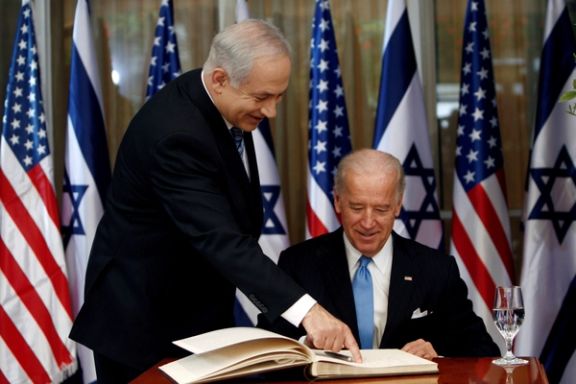
The Biden administration and Saudi officials are also discussing a possible security agreement, but the Washington is reluctant to include a NATO-style Article 5 commitment, which Riyadh wants. Article 5 provides that if a NATO ally is the victim of an armed attack, each and every other member of the alliance will consider it as an armed attack against all members and will take the actions it deems necessary to assist the ally under attack.
According to an unnamed US official, the Biden administration did not accept the Saudi request but did agree to discuss what some US officials are calling an "article 4.5" commitment — a similar security guarantee that would fall short of the Saudi expectations but would still be significant.
Moreover, The Wall Street Journal reported on Wednesday that the US and Saudi Arabia have agreed on the broad contours of the deal for Saudi Arabia to recognize Israel in exchange for concessions that would help promote the creation of a Palestinian state and civilian nuclear help as well as the security guarantees.
The WSJ claimed that US officials are cautiously optimistic that Washington and Riyadh would hammer out the finer details of what would be “the most momentous Middle East peace deal in a generation” within the next nine to 12 months. However, they warned that they face long odds. “There’s a work plan to explore the elements of what this would be and test the boundaries of what’s possible,” said one senior US official.
The efforts for what the so-called ‘mega deal’ accelerated after Saudi Crown Prince Mohammed bin Salman met in Jeddah two weeks ago with Jake Sullivan, President Biden’s national security adviser.
Biden’s efforts to finalize the deal before the US presidential election campaign starts indicate Washington’s aspirations to remain a central player in the Middle East, perhaps to contain Iran, isolate Russia, and neutralize China’s bid to supplant Washington’s interests in the region.
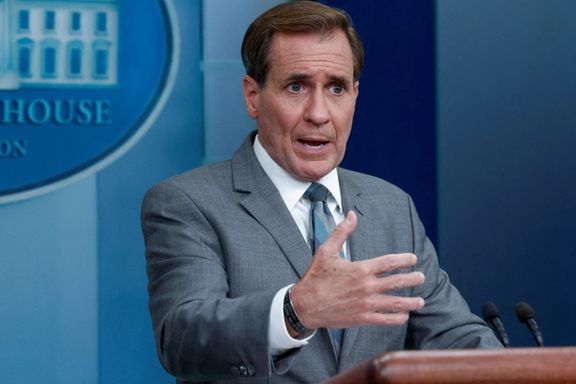
Later on Wednesday, US National Security Council spokesman John Kirby said that negotiators still had a long way to go, something that Haaretz framed as White House throwing cold water on reports of Saudi-Israel normalization.
Emphasizing that the reports gave the impression that the discussions are farther along and closer to some sense of certainty than they actually are, Kirby said, "There are still a lot of conversations that have to occur before we get there. Bottom line: there's no agreed-to set of negotiations, there's no agreed-to framework to codify normalization or any of the other security considerations that we and our friends have in the region. But there is a commitment by the administration to keep talking and to keep trying to move things forward."
In an op-ed for the WSJ on Tuesday, Israeli Foreign Minister Eli Cohen confirmed that the US should give Saudi Arabia a guarantee to defend it against Iranian nuclear aggression as part of a normalization deal with Israel. Comparing Iran's potential nuclear threat to North Korea’s actual nuclear threat to South Korea, Cohen said, “The US defense commitment acts as South Korea’s deterrent against Northern aggression. A comparable American defense pledge could reassure Middle Eastern nations, primarily Saudi Arabia and the Persian Gulf states.”
While US, Israeli, and even Saudi officials – such as Foreign Minister Faisal bin Farhan – believe that normalizing ties between Jerusalem and Riyadh would bring significant benefits to the region, Iran -- quite counterintuitively – keeps warning regional countries against it as efforts to expand the Abraham Accords to include Saudi Arabia seem likely to bear fruits.

A mother and daughter were harassed for donning optional attire in defiance of mandatory hijab, and the young girl passed out after pressure from government agents.
The incident happened at a metro station in the southern city of Shiraz, when a confrontation took place between authorities and a mother and daughter who were wearing optional attire in defiance of mandatory hijab.
Reports say officers initially obstructed the two females from entering the metro station and this sparked a prolonged verbal exchange. After the intervention of onlookers, the duo circumvented the government agents and gained access to the metro station. However, as they ascended the escalator, the strain of the situation reportedly took a toll on the young girl, and she fainted, losing consciousness.
Bystanders rushed to her aid upon the escalator's deactivation and medical personnel rushed to the scene. Subsequent reports indicate that law enforcement was called upon to disperse the crowd and discourage further filming of the incident.
This occurrence follows a broader pattern of intensified efforts by conservative factions to reinforce hijab adherence throughout Iran and has reignited the ongoing debate over the mandatory hijab rule. This recent wave of protests has intensified following the death of Mahsa Amini in police custody last September, which was a consequence of the morality police campaign targeting women for the removal of hijab.
Historically, individuals found to be contravening hijab regulations have been subject to monetary fines, while repeat offenders potentially faced more severe penalties, including incarceration and corporal punishment. Activism against the mandatory hijab decree also carries significant legal ramifications, including the prospect of prosecution and imprisonment.
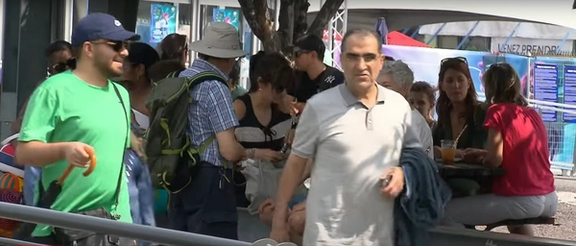
A former Iranian minister has been spotted in Montreal, leading to uproar about Canada’s loose immigration controls in allowing entry to regime’s officials.
The footage circulating on social media captured Hassan Ghazizadeh Hashemi, the former Health Minister in President Hassan Rouhani's administration, strolling through the streets of Montreal, accompanied by his family. The video is part of promotional materials for Quebec's tourism industry.
“Canada has designated the Islamic Republic of Iran as a regime that has engaged in terrorism and systematic and gross human rights violations,” Marco Mendicino, former Minister of Public Safety announced in November 2022.
After years of calls by human rights activists and Iranians dissidents, Canada finally announced sanctions last November against Iran’s Revolutionary Guard (IRGC), permanently banning over 10,000 of its officers and other senior officials from entering Canada.
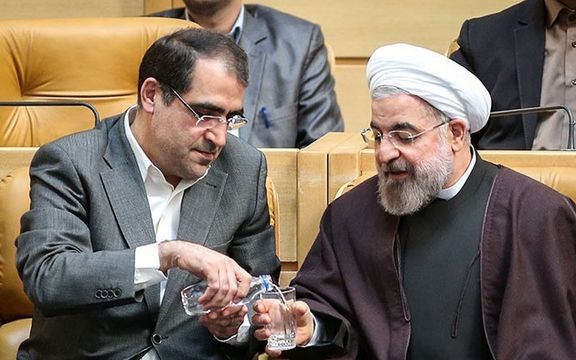
“We’re using the most powerful tools at our disposal to crack down on Iran's brutal regime. We'll be pursuing a listing of IRGC leadership under our Immigration and Refugee Protection Act, making over 10,000 senior IRGC members inadmissible to Canada,” Prime Minister Justin Trudeau said at the time.
According to Marco Mendicino, a member of parliament who was the Minister of Public Safety at the time, the entry ban into Canada was not limited to just members of the Revolutionary Guards, but also included heads of state, members of the Cabinet, ambassadors, senior diplomats, members of the judiciary, senior military and intelligence officials and senior public servants.
No Canadian official has yet commented about Ghazizadeh’s presence but the ban on regime officials “applies to those who were senior officials at any time from November 15, 2019, onwards.” Ghazizadeh was elected as the health minister in 2012 and resigned from this position in January 2017.
Nevertheless, based on the spirit of the legislation and the designation of the regime as a sponsor of terror, Ghazizadeh’s admission raises questions.
Canada-based activist and opposition figure Hamed Esmaeilion -- whose daughter and wife were killed by the IRGC in the downing of a Ukrainian airliner in 2020 -- took to Twitter on Wednesday in protest to Ghazizadeh’s presence in Canada despite the ban.
He called on Public Safety Minister Dominic LeBlanc and Immigration, Refugees and Citizenship Minister Marc Miller to follow up on the case. “We need a response and action now,” he said.
Similar calls for action abound on social media platforms with the Iranian Twitterati posting controversial remarks or actions by Ghazizadeh during his term as the health minister. Hailing from Khorasan province, Ghazizadeh’s family has always been close to the ruling regime in Iran. One of his cousins, Amir-Hossein Ghazizadeh Hashemi, a lawmaker from 2008 to 2021 is now Ebrahim Raisi’s vice president and the head of Foundation of Martyrs and Veterans Affairs, a wealthy organization in Iran with hands in numerous construction projects. Another one of his cousins is Ehsan Ghazizadeh Hashemi, also a lawmaker since 2016 and a former senior official.
Canada broke off diplomatic relations with Iran in 2012, citing its support for the Syrian government, non-compliance with United Nations resolutions over its nuclear program, and fears for Canadian diplomats after protestors stormed the British embassy.
Critics of the Islamic Republic have repeatedly called on Western countries to restrict and prohibit the travel of Iranian officials and high-ranking figures to their territories, a measure meant to prevent Western countries from being a safe haven for the regime’s officials.
The families of victims of Ukrainian flight PS752, shot down by the IRGC, have held numerous rallies calling for tougher measures against Iran.
In September 2022, a Canadian journalist criticized Ottawa for spreading a “lush welcome mat” for rich Iranians linked to the regime but refusing visas to relatives of Flight PS752 victims. Earlier in 2022, several human rights groups issued an open letter calling on Canada to stop former officers of Iran’s military and other human rights violators from entering the country after a short video of a retired commander of the Tehran's Police forces and the IRGC, Morteza Talaie, working out in a gym in Canada went viral.
Despite these calls, senior figures are being spotted in foreign countries. In one of the latest cases in early July, German media confirmed the presence of Hossein-Ali Nayeri, a 'hanging judge' involved in the summary trial and execution of thousands of Iranian prisoners in the 1980s, receiving medical treatment in a hospital in Hanover, Germany.